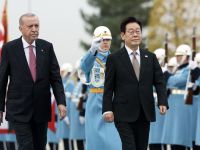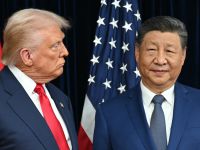Guns and violence are part of daily life in the vast tribal zones of northwest Pakistan where the call to "jihad," or holy war, is ringing out.
The Pashtun tribal belt is known as the land without laws. But, in fact, a strict and often brutal tribal code exists based on the uncompromising principle of an eye for an eye.
It is this "pukhtunwali" code of honour that is now challenging the Pakistan government's support for the United States military campaign.
The tribal militants regard the Taliban as brothers, mainly because they are all Pashtuns, and their loyalty to Afganistan's rulers is stronger than their ties to Pakistani President Pervez Musharraf's government.
In a display of ominous unity, several thousand Pakistani Pashtun tribesmen -- armed with rocket launchers, automatic rifles, swords and axes -- are close to the Afghan border waiting for approval from the Taliban to join the war against the US.
Several thousand more Pakistanis, many from the tribal zones, are believed to be already with the Taliban army in Afghanistan bracing for US-led ground forces.
Other armed tribal militants are blocking cars and trucks on Pakistan's main highway to China.
And two radical groups in the tribal areas have publicly threatened to kill anyone supporting attempts by the former Afghan king, Mohammed Zahir Shah, to prepare a post-Taliban government.
The Pakistan government has historically had little control over Pashtun territory and has allowed them to become one of the world's biggest tribal societies with lands running all the way down the mountainous northwest border with Afghanistan.
The Pahstun territories are called the "ilaqa ghair" -- the land beyond Pakistani laws -- because, to keep the peace with the fiercely independent people, the government has been forced to follow the example of the former British empire in giving them a unique form of autonomy.
About a quarter of the huge North West Frontier Province, created in 1901 by the British, is given over to about 25 Pashtun tribes, and their sub clans, in seven "agencies".
Each agency is in theory administered by a political agent appointed by the central government, who has locally recruited militia.
In effect, the agent acts as a liaison official between the heads of the tribes and the provincial governor. His main task is to make sure that tribal vendettas do not spill over into territory where the government is in charge.
The agent only has authority on roads in his agency. The rest is a kind of no-man's land run under tribal law with no taxes, where people live in clans in fortified villages.
Violence and arms are part of daily life. For safety reasons, foreigners and non-Pashtun Pakistanis have virtually no access.
Hospitality is the first rule of the Pashtun code of honour. Vengeance for any insult or perceived injustice -- such as the US military campaign -- is the second.
However the Northern Alliance, the coalition of non-Pashtun groups fighting the Taliban regime in Afghanistan, is urging the Pakistan government to do more to control the militants.
"Whatever it is, it has to be stopped. Pakistan can not claim to cooperate with the international alliance, get debt relief and then allow thousands to cross and fight the people of Afghanistan," Northern Alliance foreign minister Abdullah Abdullah said in opposition-held territory in northern Afghanistan -- ISLAMABAD, (AFP)
© 2001 Al Bawaba (www.albawaba.com)







